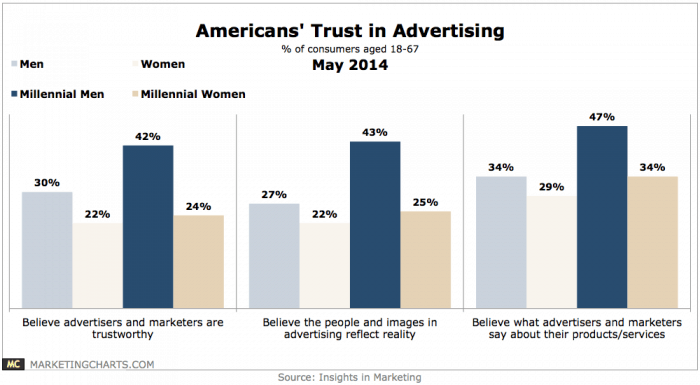We all know that advertising is biased, but it seems that we appreciate this more as we get older. The result is that, on average, four out of five of us do not trust advertisers. Worse still, only a third of people even believe that what is said in the advert is actually true.
New research from Insights in Marketing which investigated 3,450 consumers in the USA found that advertising is largely untrusted and not believed. However, the research found that “Millenials” – people now in their 20s and 30s – tend to trust and believe advertising more than older people. This suggests that as people get older, they lose trust in advertisers probably because they have been exposed to more adverts and have more experience of them. Even so, the Millenials still don’t trust or believe advertisers, on average.
The study found that women at younger ages tended to be more trusting of advertisers and tended to believe them more than men. Again, this may be due to experience and exposure – a significant amount of advertising is targeted at men, especially online.
So, what does this all tell us?
It suggests that if you use advertising as part of your marketing mix you face an uphill battle in terms of gaining trust and acceptance by your target audience.
Not only do remarkably few people engage with online advertising, but most of the people who do so do not trust it or believe it.
Why bother to advertise?
Well, in spite of the enormous negatives against advertising there are some good reasons for doing so:
[unordered_list style=”tick”]
- It increases brand awareness
- It enables you to test a market or product
- It leads to direct sales
- It helps you offset the impact of competitors who advertise
[/unordered_list]
However, you have to take into account the negative impact advertising has on trustworthiness, which means that advertisers have a lot of work to do in order to build that trust.
How do you do that?
Well you can use social media, email marketing, blogging and generating word of mouth.
But more important than any of this is having a reliable business with products and services that do what they say they do, all supported by fantastic levels of customer service.
Amazon, for instance, can get away with advertising because it delivers when it says it will, it provides exactly what you want and it is all backed up with a highly efficient customer service programme that helps build trust. It means our experience of Amazon makes us trust the company and hence any lack of trust generated by advertising is offset.
If your business is not up to scratch in any department, then advertising will likely have an overall negative impact.
What this all means is that if you want to advertise, you better have a brilliant business.


